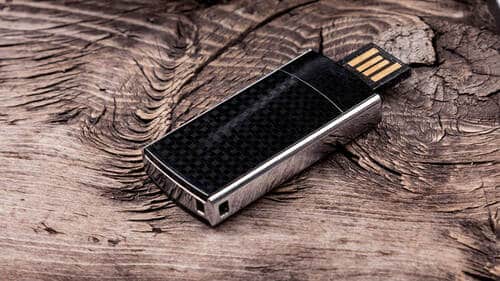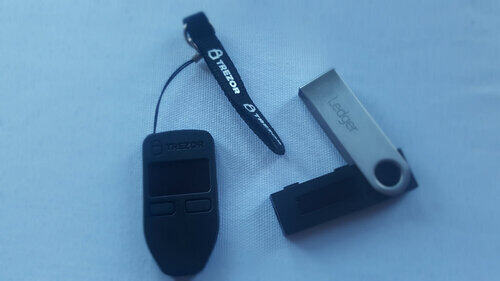A crypto wallet enables storing, sending and receiving cryptocurrencies, some wallets can be used to store multiple tokens and coins at once – however, most wallets will only support a limited number of cryptocurrencies. Wallets are used to store something known as private keys: long hexadecimal codes known only to you and your wallet. They must match with a public key so you can spend your money. Wallets come in many forms. They can be stored on hardware which is occasionally connected to the web to perform transactions (some people keep them in bank vaults the rest of the time) – you can even write the keys down on a piece of paper, which is one method of “cold storage.” Hosted wallets are akin to traditional banking apps. You can access your balance on multiple devices, and your funds aren’t gone forever if you lose your phone or forget your password.
If you want to buy any cryptocurrency, you’ll need to choose a wallet where you can securely store your coins or tokens. But if you’re just starting out, choosing a wallet and learning how to use it can feel complicated and overwhelming. Broadly there are four main categories from
- Exchange wallet eg Coinbase,
Binance , Kraken - Software/Online/Mobile wallet eg. Jaxx, Coinomi
- Hardware wallet eg Trezor or Ledger
- Paper/offline wallet eg MyEtherWallet/MyCrypto

EXCHANGES
Many newcomers buy cryptocurrency from an exchange or P2P service and leave their holdings in those sites wallets. But like any other online entity, the exchanges are vulnerable to hacking as they are particularly attractive targets. A short history of crypto exchanges gives examples of Mt. Gox, Bitfinex, NiceHash and many many others. Of all the options available, this is most cases the least secure. The reason for this is that most exchanges are in fact centralized, meaning that they’re operated by a single entity that manages the security of your data for you. This may sound good but it means that if someone manages to hack their platform, all of your details – and those of the rest of their user base – will be exposed. You’ll only really want to store your crypto in an exchange at the point when you’re planning any trading. Once you’ve completed a trade, the best thing to do is then transfer it out of there and into a more secure solution, like a hardware or paper wallet. Due to the minuscule transaction fees, this is simple and cheap to do. If for some reason you need to keep crypto in exchange wallet, make sure it is a reputable one, that is backed by large investors, for all cost avoid new created ‘local’ exchanges.
SOFTWARE/MOBILE/ONLINE WALLETS
There are three main flavors of software wallets: desktop, online and mobile. Each offers a different combination of convenience and security.
Desktop wallets are software you install on your computer. They give you lots of control over your assets but, if connected to the internet, remain vulnerable. A malware infection, the remote takeover of your computer or even if you’re not online a hard-drive failure could be a catastrophe. Online wallets are hosted on a website. This makes them convenient because they’re accessible from any internet-connected device. The downside: Your private keys are kept by the website owner and, from a technical perspective, there’s not much to stop them from simply taking your coins.
Mobile app wallets are optimized for retail transactions that are, paying for stuff with bitcoin or another cryptocurrency. But because your encryption keys are stored on your phone, you lose your coins if you lose your device. You thought it was a bummer to leave your phone in a taxi? Imagine how bad it will be if it has thousands of dollars of cryptocurrency locked on it. Relatively similar in functionality to a mobile wallet, an online wallet lives on the cloud and can be accessed from any device. They’re very handy for making quick transactions from any location/device, but the private keys are often controlled by the online wallet provider, meaning that if they get hacked, you could lose everything. As an extra security precaution, always set up 2-factor authentication on the exchange if they offer it and make sure you use a unique password.
HARDWARE WALLETS

Hardware wallets are much more secure than previous options. They often come in the form of a flash drive type device, the most popular of these being either provided by Trezor or Ledger. This wallet operates offline and manages your private key for you, so even if someone steals the device itself, they can’t actually access your funds. That said, depending on device,if you lose the device then you could lose everything – just like if you lost a pile of cash! Some hardware wallets provide a security backup phrase that you can use in case you lose your hardware wallet and want to get back access to them. Again, you’re the only one that knows this information and the hardware wallet provider doesn’t know this, so you’re not harmed if the company is hacked.For anyone storing cryptocurrency that they’re not planning to trade regularly, I’d recommend using either a hardware or a paper wallet. Another consideration for hardware wallet owners is to get a fireproof safe that they can store it in during the time it’s not being used, just as an extra security measure.
PAPER WALLETS

A paper wallet is one of the most secure ways to store your cryptocurrency. That said, they’re not always the most user-friendly. You can set up a paper wallet through a service like MyEtherWallet, MyCrypto or WalletGenerator.net and it will simply generate a public and a private key for you. Only you will have access to this information, and if you lose it, it’s gone forever. Once your public and private key are generated, you’ll also often get a QR code that you can use as well. The public key, private key, and QR code can be printed off onto a piece of paper (hence, “paper wallet”) where you will store the details. It’s vitally important that you store these in a safe place, and I’d even consider laminating the paper to avoid damage from liquid spillages. The final thing to remember here is that if someone steals the piece of paper with all these details on then they’ll get full access to all of your funds – this is where it is advised to find a safe place to store them in.
Konwing all about the different types of wallets available, it’s time to find one that’s right for you. To do that, you’ll need to consider your needs and compare a range of wallets based on several key factors, including the following:
- The type of wallet you want. This factor comes down to personal preference. For example, if security is your number-one priority, you’ll probably want to compare hardware wallets. But if your main goal is being able to quickly and conveniently access your coins, a mobile or web wallet may be your preferred choice.
- Ease of use. Sending, receiving and storing cryptocurrency can be complicated and confusing, particularly for beginners. It’s essential that any wallet you choose suits your tech knowledge and level of crypto experience. So while crypto novices might focus on finding a wallet that is simple to set up and use, experienced holders might look for more advanced features, for example an in-wallet exchange and multisignature transactions.
- Security features. Find out what security features the wallet includes, such as 2-factor authentication and multisig functionality. Will your private key be stored online or offline? Has the wallet ever suffered any security breaches?
- Other features. Check what other features the wallet includes, such as the ability to exchange between currencies within your wallet or providing easy access to live fiat exchange rates or other market information.
- Supported cryptocurrencies. Are you looking for a wallet that stores just one crypto, like bitcoin, or are you in the market for a multi-currency wallet? Make sure the wallet you choose is actually compatible with the cryptocurrencies you need to store, and remember that some coins and tokens can only be held in an official wallet.
- The team behind the wallet. Next, see what sort of information you can find out about the people behind the wallet. How long have they been in business? What qualifications do they have? Are they continually working to upgrade and improve the wallet?
- Cost. While most crypto wallets are free to use, choosing a hardware wallet means you’ll have to be willing to part with some cash. Consider the upfront price and shipping costs when making your decision. Some wallets will also charge a fee for every transaction you carry out, so check the fine print to find out whether this is the case.
- Reputation. What level of community trust does the wallet have? Check out a range of independent online reviews to gauge how other users rate the wallet and whether they would recommend it.
As a rule of thumb, if you’ve got more virtual currency than you’d be comfortable carrying around on you in cash, or you intend to hold it as a long-term investment, you should keep it in “cold storage.” This could be a computer that’s disconnected from the internet, a hardware wallet or paper wallet. Whether you choose a hardware, software or paper wallet to manage your passwords and private keys, there are things you can do to keep your cryptocurrency safe.
- Try to keep your cryptocurrencies in few wallets – possibly from different companies
- Don’t give anyone your private keys (to all your stash) – remember using online wallets means you give your key away
- Keep any larger amounts, that you don’t plan to use within a short period of time in cold storage – not connected to the internet
- Be careful with any online service – any device connected to the internet is vulnerable
- Encrypt your wallet with a strong password and store the mnemonic seed phrase in a safe place
- Always check the address before confirming a transaction
- Make regular backups and store them in multiple locations
- Use two-factor authentication security, which helps maintain control of your coins even if one of your devices is compromised
Can I Store All Types of Crypto in One Wallet?
This is where things start to get a little more complicated, currently, there isn’t a wallet that can store cryptocurrency – any cryptocurrency. But some wallets are getting there, probably someday there would be wallet to keep any cryptocurrency, but until then you’ll want to just check that the wallet you’re using actually supports the cryptocurrency that you want to store. Some of these wallets support hundreds of different cryptocurrencies.


